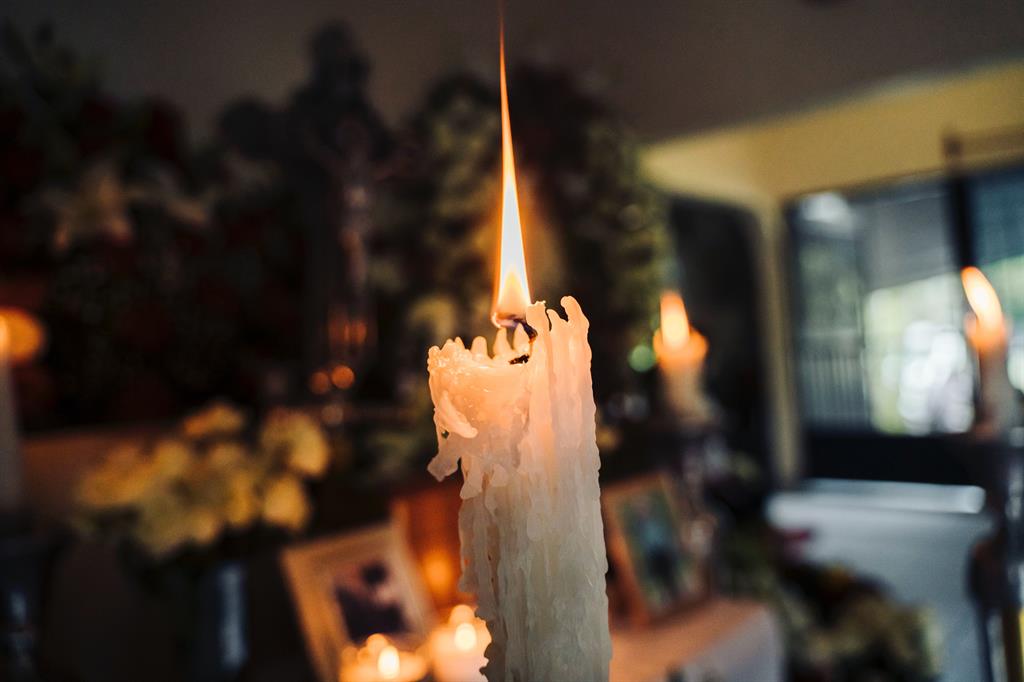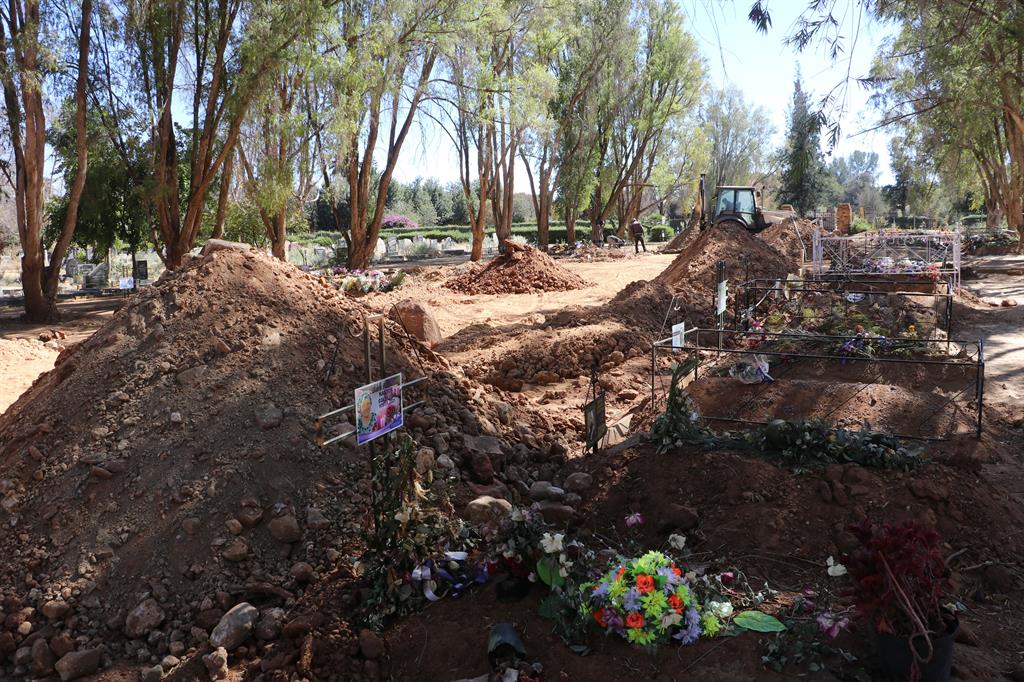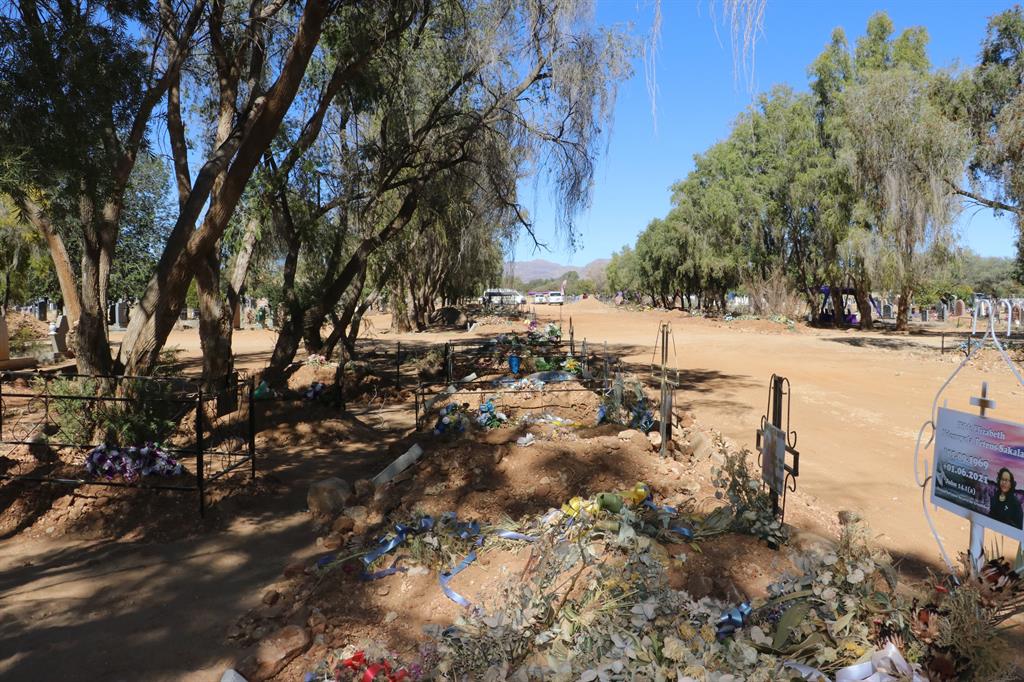Preparing for the final goodbye
To support and comfort families in one of their darkest hours is a calling, one that she answers with all her heart.
Henriette Lamprecht – Never in her life has she pondered to be part of the funeral business. Her life, however, reached a crossroad and when the door opened for an opportunity to present itself, she embraced it with open arms. Today Retha Barnard believes she has been chosen for “this very special job” as an undertaker.
Since she started investigating it as a job opportunity until she did her first funeral on 3 December 2013 and saw a dead body for the first time, less than two months have passed, says Retha.
“I believe this is the way God works. If something is meant to be, He will make it happen.”
“To be an undertaker has become my passion, and I find my job utterly fulfilling because it is a job in which you are of service to others,” she explains.
People confronted with the death of a loved one are sad and broken. Most of the time, they don’t know what to do and need guidance on how to handle the procedure of a funeral.
“Few people discuss death, not to mention funeral arrangements. Death, therefore, catches them off guard. A lot of people die without a will, and the family left behind are lost.”
A lot of people who experience such a trauma afterward admit that they don’t remember much of that part of their life. It is her work to carry these families in this time, listen to their needs, supporting them in arranging the funeral with dignity, according to the different traditions and rituals to make it a special occasion.
“Without a proper burial or memorial service, it is very difficult for the family to get closure and move on.”
Retha admits there is no guide to treat people who are mourning - the closest thing to a guide is humanity. Many words aren't needed, because no words that can take away death and the devastating loss it brings, she says.
“There is more power in being still and listening as families talk about their emotions and loss.”
The most difficult funerals are those of children and young people. Suicide even more so, as the family is left with many unanswered questions. Sometimes she has to deal with the funeral of someone close to her - a friend or a family member.
“One can only hand it over to God. We are powerless against death, but because we love and know Jesus, we also know the source of victory, and that gives us hope and solace.”
There are times people know exactly which type of flowers and coffin is to be used, often chosen according to the kind of person the deceased was - the kind of personalities, and the standing they had in their communities.
The most challenging part of her work is that people associate her with death and the losses they experienced, says Retha.
“Every time they see me, they are reminded of that time and circumstances. I can often see the pain and memories in their eyes and body language, the way they are trying to scramble away. It makes me feel a bit like the Angel of Death, and I must admit it has quite a negative influence on one’s social life,” Retha admits.
Some families are “more difficult than others” without realising it, but she believes “love intensifies all emotions."
“When it comes to raw emotions over a loved one, people can get demanding, but because we understand where it comes from, we can handle it with patience and try to support them to the best of our ability, making their final goodbye as special as they would like to have it.”
Most of the time, people are thankful and it is the most satisfying feeling to be of service to someone and be appreciated for it.
Not all families can take last care of their loved one’s body, and it is always a privilege to do it for them, says Retha.
“We put our heart and soul in our work and physically feel the pain and loss of the family because we work closely with them. We are literally the link between the living and the dead.
When the family is satisfied and thankful, we know we reached our goal to make this bitter farewell a bit easier with the way we handled their loved one, as well as the burial or cremation.”
A while ago, Retha had to bury the son of one of her best friends who died in a car accident, which was terrible, she admits.
“It tore my heart and I struggled immensely. It was the most difficult thing but also the most rewarding. I know I am now part of the memory of the most painful experience in her life, but I am also thankful that I could stand in for her and take care of her little boy when she was no longer able to. For me, it was still a privilege.”
It is impossible not to feel the pain of others, she says.
“There is so much pain in the loss death brings - it is impossible not to feel and experience it. Death personifies a lifeless body which is a devastating reality and it is there that we stand in for families. We are the people that need to put the broken bodies together again and prepare them for viewing and burial. We must take care of their loved ones and dress them in their final clothes. Even if it's not my loss, I feel the pain and hurt.”
Sometimes when she hears of the passing of someone she knew, knowing the family would want her to do the funeral, Retha admits she sometimes wants to “hide to avoid it.”
“But I know this is my job, this is what I was chosen for, and I must be strong for this family. God is faithful. He doesn’t call you without equipping you, to Him all the honour.”
Concerning women being more emphatic than men, she doesn’t want to generalize and says it varies from person to person.
“One can come across men that are very sympathetic and with whom you feel comfortable opening your heart.”
It is a fact that women and mothers were always the comforters and it can be that some people feel safer around them. She would, however, put women above men in any way. – [email protected]
Since she started investigating it as a job opportunity until she did her first funeral on 3 December 2013 and saw a dead body for the first time, less than two months have passed, says Retha.
“I believe this is the way God works. If something is meant to be, He will make it happen.”
“To be an undertaker has become my passion, and I find my job utterly fulfilling because it is a job in which you are of service to others,” she explains.
People confronted with the death of a loved one are sad and broken. Most of the time, they don’t know what to do and need guidance on how to handle the procedure of a funeral.
“Few people discuss death, not to mention funeral arrangements. Death, therefore, catches them off guard. A lot of people die without a will, and the family left behind are lost.”
A lot of people who experience such a trauma afterward admit that they don’t remember much of that part of their life. It is her work to carry these families in this time, listen to their needs, supporting them in arranging the funeral with dignity, according to the different traditions and rituals to make it a special occasion.
“Without a proper burial or memorial service, it is very difficult for the family to get closure and move on.”
Retha admits there is no guide to treat people who are mourning - the closest thing to a guide is humanity. Many words aren't needed, because no words that can take away death and the devastating loss it brings, she says.
“There is more power in being still and listening as families talk about their emotions and loss.”
The most difficult funerals are those of children and young people. Suicide even more so, as the family is left with many unanswered questions. Sometimes she has to deal with the funeral of someone close to her - a friend or a family member.
“One can only hand it over to God. We are powerless against death, but because we love and know Jesus, we also know the source of victory, and that gives us hope and solace.”
There are times people know exactly which type of flowers and coffin is to be used, often chosen according to the kind of person the deceased was - the kind of personalities, and the standing they had in their communities.
The most challenging part of her work is that people associate her with death and the losses they experienced, says Retha.
“Every time they see me, they are reminded of that time and circumstances. I can often see the pain and memories in their eyes and body language, the way they are trying to scramble away. It makes me feel a bit like the Angel of Death, and I must admit it has quite a negative influence on one’s social life,” Retha admits.
Some families are “more difficult than others” without realising it, but she believes “love intensifies all emotions."
“When it comes to raw emotions over a loved one, people can get demanding, but because we understand where it comes from, we can handle it with patience and try to support them to the best of our ability, making their final goodbye as special as they would like to have it.”
Most of the time, people are thankful and it is the most satisfying feeling to be of service to someone and be appreciated for it.
Not all families can take last care of their loved one’s body, and it is always a privilege to do it for them, says Retha.
“We put our heart and soul in our work and physically feel the pain and loss of the family because we work closely with them. We are literally the link between the living and the dead.
When the family is satisfied and thankful, we know we reached our goal to make this bitter farewell a bit easier with the way we handled their loved one, as well as the burial or cremation.”
A while ago, Retha had to bury the son of one of her best friends who died in a car accident, which was terrible, she admits.
“It tore my heart and I struggled immensely. It was the most difficult thing but also the most rewarding. I know I am now part of the memory of the most painful experience in her life, but I am also thankful that I could stand in for her and take care of her little boy when she was no longer able to. For me, it was still a privilege.”
It is impossible not to feel the pain of others, she says.
“There is so much pain in the loss death brings - it is impossible not to feel and experience it. Death personifies a lifeless body which is a devastating reality and it is there that we stand in for families. We are the people that need to put the broken bodies together again and prepare them for viewing and burial. We must take care of their loved ones and dress them in their final clothes. Even if it's not my loss, I feel the pain and hurt.”
Sometimes when she hears of the passing of someone she knew, knowing the family would want her to do the funeral, Retha admits she sometimes wants to “hide to avoid it.”
“But I know this is my job, this is what I was chosen for, and I must be strong for this family. God is faithful. He doesn’t call you without equipping you, to Him all the honour.”
Concerning women being more emphatic than men, she doesn’t want to generalize and says it varies from person to person.
“One can come across men that are very sympathetic and with whom you feel comfortable opening your heart.”
It is a fact that women and mothers were always the comforters and it can be that some people feel safer around them. She would, however, put women above men in any way. – [email protected]







Kommentar
Allgemeine Zeitung
Zu diesem Artikel wurden keine Kommentare hinterlassen